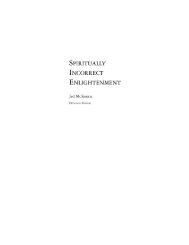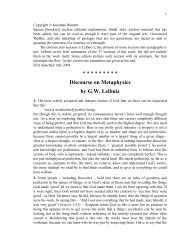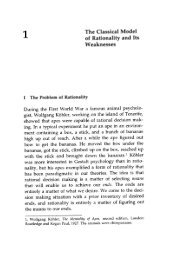Marcus Aurelius (121 180 AD) Imperator Caesar ... - Naturalthinker.net
Marcus Aurelius (121 180 AD) Imperator Caesar ... - Naturalthinker.net
Marcus Aurelius (121 180 AD) Imperator Caesar ... - Naturalthinker.net
You also want an ePaper? Increase the reach of your titles
YUMPU automatically turns print PDFs into web optimized ePapers that Google loves.
<strong>Marcus</strong> <strong>Aurelius</strong> (<strong>121</strong> <strong>180</strong> <strong>AD</strong>)<br />
<strong>Imperator</strong> <strong>Caesar</strong> <strong>Marcus</strong> <strong>Aurelius</strong> Antoninus Augustus<br />
Ascended to the throne of Imperial Rome in 161 <strong>AD</strong>, aged forty.<br />
Considered by most historians to be the last great pagan emperor<br />
of Rome. His reign was blighted by problems, most notably the<br />
first waves of barbarian incursions, which threatened the<br />
boundaries of the Empire. However, <strong>Marcus</strong> was revered as a<br />
wise and benign ruler; he was the closest the world ever saw to the<br />
incarnation of Plato s ancient ideal of a philosopher-king. The<br />
historian Edward Gibbon, in his monumental The History of the<br />
Decline and Fall of the Roman Empire, famously defined <strong>Marcus</strong><br />
as the last emperor to reign over the golden age of Imperial peace and justice, known as the<br />
Pax Romana,<br />
If a man were called to fix the period in the history of the world during which the<br />
condition of the human race was most happy and prosperous, he would, without<br />
hesitation, name that which elapsed from the death of Domitian to the accession of<br />
Commodus [adopted son of <strong>Marcus</strong> <strong>Aurelius</strong>]. The vast extent of the Roman Empire<br />
was governed by absolute power, under the guidance of virtue and wisdom. The<br />
armies were restrained by the firm but gentle hand of four successive emperors,<br />
whose characters and authority commanded respect. The forms of the civil<br />
administration were carefully preserved by Nerva, Trajan, Hadrian, and the Antonines<br />
[Antoninus Pius and his nephew <strong>Marcus</strong> <strong>Aurelius</strong> Antoninus], who delighted in the<br />
image of liberty, and were pleased with considering themselves as the accountable<br />
ministers of the laws.<br />
Upon his death, <strong>Marcus</strong> son, Commodus, was enthroned as Emperor of Rome. Commodus<br />
was a notoriously vile and sociopathic creature. He was obsessed with the bizarre idea of<br />
making himself a legendary gladiator and, fully armed and armoured, fought thousands of<br />
rigged bouts in the Colosseum against unfortunate opponents who were armed only with<br />
wooden swords. Rome s citizens thought he was mad. The Empire began to fall into decline.<br />
The death of <strong>Marcus</strong> and subsequent debauchery of Commodus rule are portrayed<br />
with considerable poetic licence in the Hollywood film Gladiator (2000), in which the aged<br />
<strong>Marcus</strong> is played by Richard Harris.<br />
The Meditations<br />
<strong>Marcus</strong> was the last great philosopher of the Stoic school, although during his life he was not<br />
renowned as a thinker. In fact, scholars believe <strong>Marcus</strong> had not actually completed his full<br />
training in the Stoic curriculum; he was a novice Stoic. He never published his writings, and<br />
did not seem involved in public debate of philosophy. His fame as a philosopher arrived after<br />
his death when his personal meditations were uncovered and published.<br />
Written c. 170 <strong>AD</strong>, amidst the din and gore of battle, while <strong>Marcus</strong> was commanding<br />
his legions against the barbarian tribes. For many centuries the Meditations was considered to<br />
be a curiously disorganised collection of philosophical musings, a random potpourri of ideas.<br />
Modern scholarship has now established that the book is actually a private therapeutic<br />
workbook or journal, and its contents the record of a programme of highly structured Stoic<br />
psychological exercises. Greek was the standard technical language of philosophy, so<br />
although <strong>Marcus</strong> was Roman, and a native Latin speaker, he wrote the Meditations in Greek.<br />
It is important to realise that for <strong>Marcus</strong>, Stoicism was a popular philosophy which<br />
had already endured for c. 500 years, and was firmly rooted in much a larger tradition of<br />
practical philosophy going back to Pythagoras, almost 750 years earlier. It had been the<br />
philosophy of many of his forebears and heroes, and of countless millions of ordinary people.<br />
Stoicism was already an ancient and tested lifestyle, well suited to the psychological demands<br />
of military leadership and political sovereignty.
The Way of the Stoic<br />
Philosophy as "The Natural Life."<br />
<strong>Marcus</strong>: "The task of philosophy is modest and straightforward."<br />
Stoic Mysticism: The Primal Dionysian Myth<br />
<strong>Marcus</strong>: "an individual's mind is God, and is of God", "God gave each of us to lead and guide<br />
us, a fragment of himself. Which is our mind, our logos."<br />
Bear with me on this one... Zeus, the King of Gods, had many illegitimate children. He<br />
proclaimed one of his sons, Dionysus the god of wine, successor to the throne of Heaven.<br />
Hera, Zeus' notoriously jealous wife, was furious and sent the Titans, gigantic earthbound<br />
monsters, to hunt down and destroy the infant Dionysus. The Titans distracted Dionysus with<br />
toys, a rattle, and by showing him his reflection in a mirror, leading him away from safety to a<br />
place of ambush. They tore him to shreds, devouring the pieces of his body in a grotesque act<br />
of primal cannibalism (original sin?). Zeus "the Thunderer" was incensed and blasted the<br />
Titans with bolts of lightning (his sacred weapon). Their bodies were burned to ashes, upon<br />
which Zeus caused the rains to pour. Now the ashes of the Titans mixed with the rain and<br />
congealed around the divine fragments of Dionysus, the sacred "sparks" of Aether. Thus<br />
human beings were formed, dual natured (Plotinus: "amphibious"), from the ashes of the<br />
Titans and the fragments of Dionysus. Ovid: "There is a god within us." Orphics: "I am the<br />
child of Earth [Titanic] and Starry Heaven [Olympian]."<br />
If man is composed of an inner fragment of divinity which has become earthbound and<br />
torn away from its whole self, an obvious agenda for mysticism will be to release the divine<br />
"spark" from the body and reunite it with other alienated shards of the total divinity, the All-<br />
Soul. The last words of the last great pagan philosopher, Plotinus, on his deathbed: Strive to<br />
give back the Divine in yourselves to the Divine in the All!<br />
This primitive salvation myth forms the generic mystical background presupposed in<br />
much classical philosophy prior to Stoicism. Man is embroiled in an existential struggle<br />
between his dual Titanic and Olympian natures. There are many indirect allusions to it in the<br />
Meditations. <strong>Marcus</strong> would have seen this legend as something like a poetic illustration of<br />
Stoic mysticism, a metaphor, he certainly would not have taken it very literally. Plato<br />
famously evoked the same mythological language when he defined philosophy as a "battle of<br />
gods and Titans (gigantomachia) over the very nature of existence."<br />
The Popular Tripartition of the Soul<br />
<strong>Marcus</strong>: "Your three components: body, breath, mind. Two are yours in trust; to the third<br />
alone you have clear title.", "Body. Soul. Mind. Sensations: the body. Desires: the soul.<br />
Reasoning: the mind."<br />
1) Nous ([inner] mind), "intuitive" or "creative" intelligence, the "true self", the "inner man",<br />
the immortal soul; pneuma (spirit); the Star Daemon, or "god within." The essential soul,<br />
"that which moves itself." The Olympian nature.<br />
2) Psyche (breath), the mortal soul; "flitting" between body and spirit. The soul "encrusted"<br />
with matter. The "mixed" nature between the polar opposites of Olympian and Titan.<br />
3) Soma (body), the external matter which adheres to the soul. Soma-Sema, the body is a<br />
cave/prison (for the soul). The Titanic nature.
The "Serenity Prayer" of Alcoholics Anonymous<br />
Is this Stoic? Origins uncertain. What is certain: The simplest formulation I know of the<br />
basic Stoic doctrine. It encapsulates the simple threefold structure of the Stoic Rule of Life:<br />
God,<br />
Grant me the serenity<br />
to accept the things I cannot change;<br />
courage to change the things I can;<br />
and wisdom to know the difference.<br />
The Threefold Rule of Life & Stoic Curriculum<br />
<strong>Marcus</strong>: "Apply them constantly, to everything that happens: Physics, Ethics, Logic."<br />
1) Logic: The Discipline of Judgement (or Assent)<br />
<strong>Marcus</strong>: "Objective judgement, now, at this very moment."<br />
Wisdom to know the difference. "Distinguish between what depends upon me and what does<br />
not." Separation (khorismos) of (my) thought from (external) matter. Withhold assent, i.e.,<br />
suspend judgement from every idea except those which are phantasia kataleptike (that which<br />
is compelling, objective, and true). Analyse things in terms of their essence, and objective<br />
nature, strip away value judgements and projection. Greek "Skepticism" as suspension of<br />
moral value judgements (epoche). Shakespeare's Hamlet: "Nothing is good or bad but<br />
thinking makes it so." The Pythagorean "Ox on the tongue." Stick to the facts!<br />
2) Ethics: The Discipline of Action (or Impulse)<br />
<strong>Marcus</strong>: "Unselfish action, now, at this very moment."<br />
Courage to change what I can. Stick to the fundamental goal, act with authenticity and<br />
without egotism. This is the key to eudaimonia, the kind of happiness which comes from<br />
fulfilment. Happiness is found when we transcend the limited confines of our ego and<br />
become one with the All, including all of mankind. By acting with social justice we reunite<br />
ourselves with the souls of all mankind and become more than an isolated, individual ego.<br />
The mystical "fragments" are re-integrated.<br />
When <strong>Marcus</strong> reminds himself that his single, fundamental goal in life should be the<br />
universal City of all mankind, we could be mistaken for thinking he is talking somehow as<br />
Emperor, about Roman politics. He means the metaphysical goal of becoming at one with all<br />
mankind, of feeling a sense of mystical union with all other men and women: in Biblical<br />
language "to love your neighbour as yourself."<br />
3) Physics: The Discipline of Desire (and Aversion)<br />
<strong>Marcus</strong>: "Willing acceptance of all external events, now, at this very moment."<br />
Epictetus: "Do not seek for things to happen the way you want them to; rather, wish that what<br />
happens happens the way it happens: then you will be happy."<br />
Serenity to accept the things I cannot change. Accept things for what they really are.<br />
See the bigger picture ("creature consciousness", view from above) and accept the fact that all<br />
material things are transient (panta rei., All is in flux. ), especially your own impermanence<br />
(memento mori, Remember you must die , melete thanatou, Meditation on death. ).<br />
To accept what is allotted by fate or destiny. Piety, reverence: Pythagoras "follow the<br />
gods" = <strong>Marcus</strong>: "follow the Logos." A Stoic metaphor: The dog tied to the horse and cart;<br />
either the dog follows the cart willingly, or pulls on its lead but is dragged along anyway,<br />
choking and straining. Man following the Logos.<br />
Amor fati, "love your destiny." "Follow the gods", "Follow Nature." = accept and be<br />
at one with nature. "Indifference to indifferent things."
The Four Cardinal Virtues of Western Philosophy<br />
1) Sophia. Wisdom (Truth)<br />
Philosophy means "love of wisdom." Socrates: "All virtues are one." = Wisdom.<br />
2) Dikaiosyne. Authenticity/Justice (Justice)<br />
Dual meaning: (i) personal authenticity, "The unanimity of the soul with itself", (ii) social<br />
justice, "treating others with equality."<br />
3) Sophrosyne. Self-Control (Temperance)<br />
Philosophy virtually identified with self-mastery; leads to Serenity (ataraxia).<br />
4) Androsyne. Courage (Fortitude)<br />
The philosopher is unafraid of death. He has already achieved partial separation (khorismos)<br />
from his body. Socrates as the archetypal "existential hero."<br />
<strong>AD</strong>DENDA:<br />
Some Ancient Concepts in Modern Language<br />
The Oxford English Dictionary (OED)<br />
philosophical adj. 3. calm in adversity.<br />
stoical adj. Having or showing great self-control in adversity.<br />
Our modern use of the word philosophical is sometimes simply a synonym for stoical ,<br />
meaning self-control and serene acceptance in the face of adversity. When we say He had<br />
some bad luck, but was quite philosophical about it , we really mean He was Stoical<br />
Spartan adj. 2. (usu. spartan) showing the indifference to comfort or luxury<br />
traditionally associated with ancient Sparta; austere, rigorous, frugal.<br />
The Stoics, like most ancient philosophers, were renowned for the fact that they imitated the<br />
lifestyle associated with ancient Sparta. Stoics were therefore, in a sense, Spartan in their<br />
way of life, meaning that they rejected luxury for its own sake and sought to toughen their<br />
bodies and their minds by plain living.<br />
This tough militaristic dimension to Western philosophy is virtually unrecognised<br />
by scholars, but enormously significant. From Socrates onward, virtually all philosophers,<br />
and especially the Stoics, lived like Spartan foot soldiers. Stoic philosophers would have<br />
generally been recognisable by their appearance. They wore the antiquated-looking, short,<br />
grey cotton cloak of the Spartans (called a tribon), walked barefoot, and shaved their heads.<br />
They also exhibited specific lifestyle habits, e.g., they had very minimalist tastes in<br />
furnishing, ate simple foods, and slept on a hard mat on the floor. They were, in a sense, in a<br />
slightly different social class from normal Roman citizens, socially accepted outsiders , and<br />
were even classified as different from normal citizens in Roman law.<br />
<strong>Marcus</strong> would have probably been exempt from the Spartan dress code because of the<br />
practicalities of his regal station, although he did adopt other aspects of the Stoic lifestyle.
This document was created with Win2PDF available at http://www.daneprairie.com.<br />
The unregistered version of Win2PDF is for evaluation or non-commercial use only.








